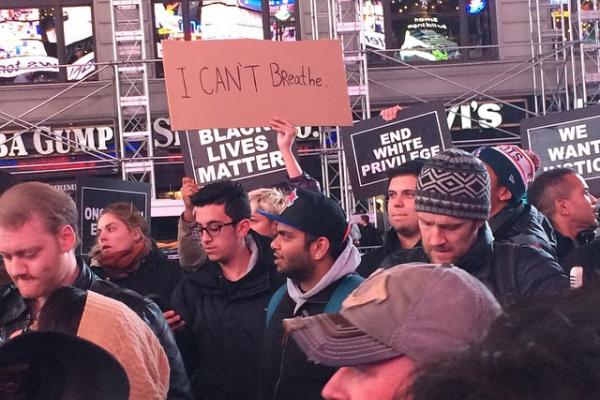I was in Ferguson Wednesday when it happened: In a morally stunning decision, a Staten Island grand jury announced it would not bring criminal charges against a white police officer who choked a black man to death during a brutal incident last July. Stopped for allegedly selling some loose and therefore untaxed cigarettes, officer Daniel Pantaleo put a “chokehold” on Eric Garner, despite the fact that the move is against NYPD rules. Video of the incident shows Garner uttering his last words, “I can’t breathe.” New York’s medical examiner officially called this a “homicide,” but the grand jury said no charges will be made.
Of course, this comes just 10 days after the Ferguson grand jury decision not to indict another white police officer, Darren Wilson, for fatally shooting an unarmed black teenager named Michael Brown on Aug. 9. Sojourners had convened a retreat in Ferguson for both national faith leaders and local pastors to look deeply at the historical and theological foundations of the Ferguson events and reflect upon how the church must respond. Emotional calls from pastors in New York City came with the horrible news, and people just began to weep — one young man wailing, “This time it was all on video …. and it still didn’t matter! How can I as a black man bring a black son into this world?” Lament and prayers followed with a resolve from an extraordinary two days on the ground in Ferguson — to act.
Local experts in St. Louis County helped us understand the damage done to their local communities for decades that led to the response that erupted after the killing of Michael Brown. We walked silently and prayerfully alongside the memorial to the slain teenager on West Canfield Avenue with black parents imagining their own sons lying there, and white parents realizing this would never happen to our kids. We kept looking at the street where this bloody incident had taken place, feeling more and more doubt about the narratives the county prosecutor had used to exonerate and excuse the white police officer from any responsibility — or at least a trial to publically sort out “conflicting testimonies.”
We met in a church with seven young leaders of the Ferguson protest movement. In just 116 days, these young people had become self-educated and extraordinary leaders, and we listened to a compelling analysis of their urgent situation and how they were trying to apply the history of social movements to change their oppressive circumstances. Their chilling stories of police harassment and brutality, preceded by a narrative of the educational and economic brutality that black young people like them experience daily were transforming words for those of us who listened, spellbound. As I listened, I realized America would be converted by these young people’s honest and earnest conversation — they would win the national debate about our criminal justice system’s response to young people of color.
Read the Full Article

